Britten 100: An Aldeburgh Centenary Diary | reviews, news & interviews
Britten 100: An Aldeburgh Centenary Diary
Britten 100: An Aldeburgh Centenary Diary
Distinguished broadcaster and documentary-maker celebrates the big birthday at home
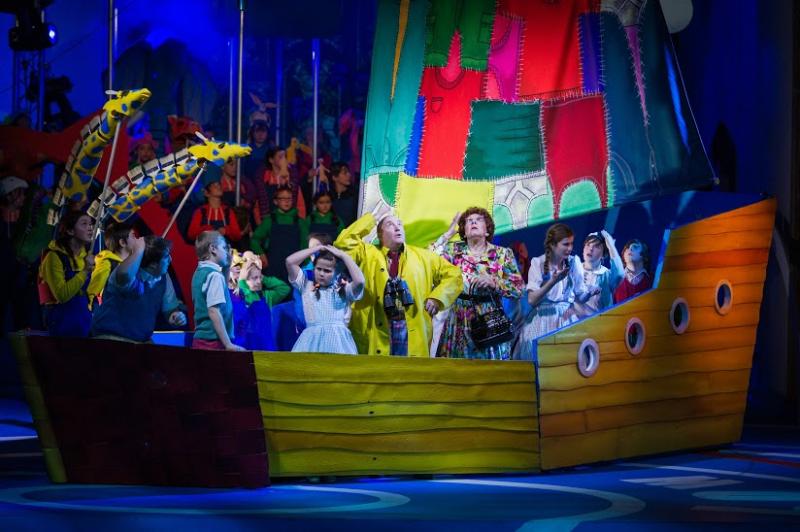
The most intensive period of music-making I’ll ever experience, celebrating the 100th birthday of Benjamin Britten in and around his home town, ended on Sunday. I’m an Aldeburgh resident and I attended everything on offer. I thought the best way to provide an overview was to compile a diary of the past four days with a line or two about each event.
Thursday 21 November (eve of the birthday)
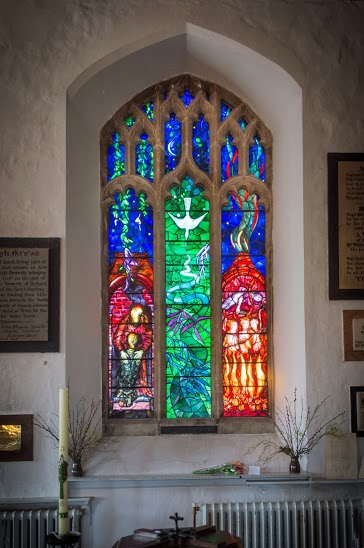 3pm A stiff North-East wind is blowing down Crag Path and the rain is near horizontal: the Storm Interlude from Peter Grimes comes to mind. A brisk walk up the hill to pay respects in the churchyard to the gravestones of our blessed festival trinity: Britten, Pears and Imogen Holst. Inside, the inspired John Piper stained glass window celebrating Britten’s trinity of church parables (pictured right), overlooked by the forbidding bust of George Crabbe, poet of The Borough on which Peter Grimes is based.
3pm A stiff North-East wind is blowing down Crag Path and the rain is near horizontal: the Storm Interlude from Peter Grimes comes to mind. A brisk walk up the hill to pay respects in the churchyard to the gravestones of our blessed festival trinity: Britten, Pears and Imogen Holst. Inside, the inspired John Piper stained glass window celebrating Britten’s trinity of church parables (pictured right), overlooked by the forbidding bust of George Crabbe, poet of The Borough on which Peter Grimes is based.
5.30pm Off to Lowestoft, Britten’s birthplace, for the premiere in the lovely 14th century parish church of a new production of Noye’s Fludde. Best I’ve ever seen. Martin Duncan’s brilliant 1950s version has God (Zeb Soanes from Radio 4) as a mild-mannered civil servant; Noah’s ark is a stylised beach hut. Designer Francis O’Connor has a field day with the animals, who include ingenious and witty elephants, giraffes and crocodiles (pictured below). The local children, dozens of ’em, are entrancing, ditto the buglers and the handbell ringers. Andrew Shore is humane and touching as Noah, Felicity Palmer appropriately cantankerous as his wife. We all sing our hearts out in “Eternal Father” under the vigilant baton of Paul Kildea. What a start to the weekend! Three more performances were equally successful, I’m told: what a shame this lovely show hasn’t been filmed.
Friday November 22
10am Visit to the Red House. Because it’s BB’s actual birthday, St Cecilia’s Day, we are allowed in free and every room, upstairs and downstairs, is open to the public. What a splendid collection of paintings and china! The composing studio, restored to how it looked in the 60s when I filmed Britten at work, is especially moving and the new archive building is a triumph of beautiful functional design.
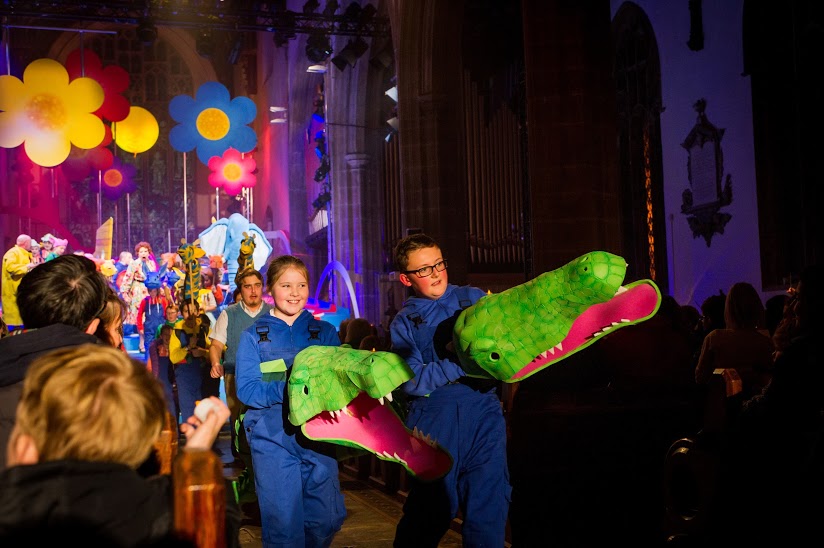 12.30pm To Snape, ten minutes drive inland: the Britten Studio in the wondrous Hoffman Building hosts the first concert of the birth-day, featuring the Benyounes Quartet, a highly-rated young English group. They play three Purcell Fantasias and Britten’s astonishing Second Quartet; in between comes young Philip Higham, performing from memory the Second Suite for solo cello, written for Rostropovich and mind-bogglingly difficult in places. The tone is set for the weekend: performances of the highest order technically and creatively.
12.30pm To Snape, ten minutes drive inland: the Britten Studio in the wondrous Hoffman Building hosts the first concert of the birth-day, featuring the Benyounes Quartet, a highly-rated young English group. They play three Purcell Fantasias and Britten’s astonishing Second Quartet; in between comes young Philip Higham, performing from memory the Second Suite for solo cello, written for Rostropovich and mind-bogglingly difficult in places. The tone is set for the weekend: performances of the highest order technically and creatively.
4.30pm A birthday party in Jubilee Hall. Private enterprise event organized by Jenni Wake Walker. On the platform forty children from four very local schools, among them our very own Aldeburgh Primary. Sandwiches and tea for the entire 250 strong audience. The kids sing the first five numbers from Friday Afternoons, sparkling stuff conducted by Phelan Burgoyne Then they ask questions of the Britten veterans Jenni has assembled, among them nephews John, Alan and Sebastian and Peter Pears’s niece Sue Phipps: what were Britten’s hobbies? did he have allergies? did he like being photographed? More songs, flapjacks and cookies, followed by more questions and a Happy Birthday iced cake (pictured over the page) - a truly charming local event!
7.30pm Snape Maltings Concert Hall. The climax of the birthday (pictured below) – the BBC Symphony Orchestra in all its glory, behind it the BBC Symphony Chorus and dozens of gifted young singers from Norwich, filling this lovely hall with the epic sounds of the Spring Symphony and, earlier, the unfamiliar but beguiling Cantata Academica. Most powerful music of the evening: the Four Sea Interludes from Peter Grimes with the Passacaglia judiciously placed in the middle. Oliver Knussen in charge, conducting with steely beat and superb intensity. We Aldeburghers lapped up Grimes on the Beach only five months ago; this Britten experience was on a par.
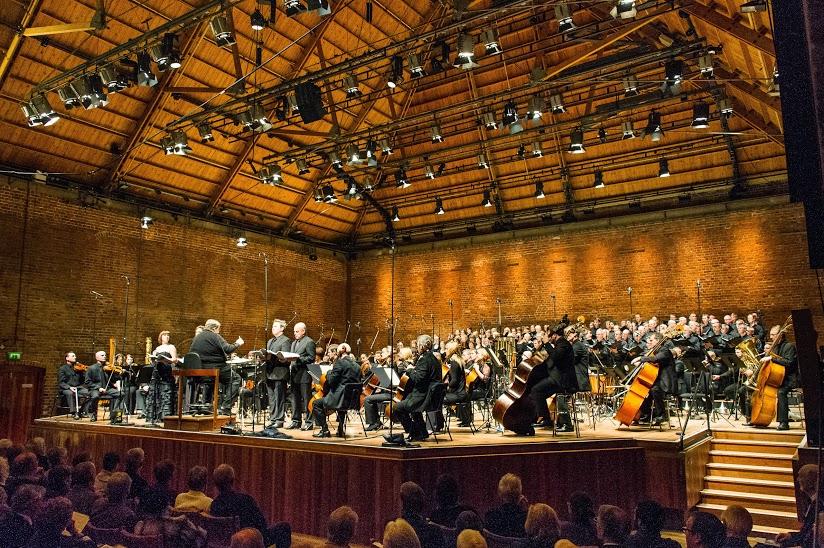
Saturday 23 November 23
11am SMCH Family Concert. Back at the Maltings 13 hours later for the Young Person’s Guide to the Orchestra conducted by Mark Elder protégé Andrew Gourlay; Johny Pitts recited Simon Butteriss’s clever narrative verses to great effect. This is labelled a family affair but I suspect there are more parents than kids in the house. However we all have a good time: Soirées Musicales, based on Rossini, is a romp and early evidence of Britten’s tremendous skill as an orchestrator. BB would have approved the inclusion of three short choral pieces by young composers, sung by children from Bury St Edmund’s, Ipswich and Woodbridge. 16 year olds Jay Richardson and Luke Fitzgerald are full of promise and we already know composer Anna Meredith as a gifted all-rounder. Her cunning catch The Car is conducted by former ENO diva Claire Weston.
2.30pm Orford Church (pictured below). This tribute concert includes Britten’s church music sung in his favourite church, mounted by the Aldeburgh Music Club Choir. BB and Pears helped to found the club in 1952, since when it’s evolved into a choral society (I’m currently its president). Britten scholar Philip Reed, once the club’s music director, is on hand to set in context incongruously four-square pre-war BB compositions such as Advance Democracy and the Pacifist March.
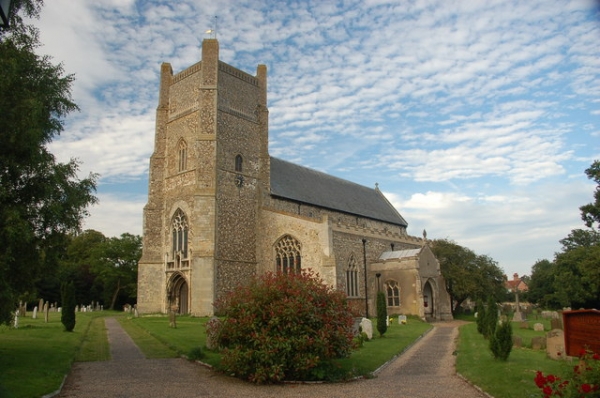 Conductor Edmond Fivet brings his sonorous Prometheus Brass Ensemble into play with Purcell Funeral Odes and BB’s rarely heard Russian Funeral Music and a real bonus comes with the two choral works commissioned by the AMC to celebrate its own 60th birthday last year. Joseph Phibbs speaks feelingly about his debt to Britten before we hear his Choral Songs of Homage and Joanna Lee is on hand to supervise her colourful cantata Merman about a 14th century sea-monster which was tortured in Orford Castle before escaping to haunt the fisherfolk over the centuries - an echo of up-the-coast Peter Grimes, confidently dispatched by AMC and Framlingham’s Thomas Mills High School Senior Choir under dynamic Laura Scott. Virtuoso percussionist George Barton is breathtakingly active; BB would have admired Joanna’s inventive use of upturned frying pans as musical instruments.
Conductor Edmond Fivet brings his sonorous Prometheus Brass Ensemble into play with Purcell Funeral Odes and BB’s rarely heard Russian Funeral Music and a real bonus comes with the two choral works commissioned by the AMC to celebrate its own 60th birthday last year. Joseph Phibbs speaks feelingly about his debt to Britten before we hear his Choral Songs of Homage and Joanna Lee is on hand to supervise her colourful cantata Merman about a 14th century sea-monster which was tortured in Orford Castle before escaping to haunt the fisherfolk over the centuries - an echo of up-the-coast Peter Grimes, confidently dispatched by AMC and Framlingham’s Thomas Mills High School Senior Choir under dynamic Laura Scott. Virtuoso percussionist George Barton is breathtakingly active; BB would have admired Joanna’s inventive use of upturned frying pans as musical instruments.
6pm Aldeburgh Church St Nicholas. Just time for a hasty pit-stop before another choral concert, this time back at base with a small professional orchestra (all Suffolk residents) led by Clio Gould. Ben Parry is conducting and his amateur choir, Aldeburgh Voices, sings the entire work from memory - most impressive and a great aid to communication. Alan Oke sings the saint with the same expressive insight he brought to bear on Grimes and Aschenbach earlier in the year – he is a national treasure. A word, too, in praise of the fluent duet pianists Gretel Dowdeswell (who also coached the children for Noye’s Fludde) and Bill Lloyd (who doubles as director of artist development at the Britten Pears School). What a joyful piece this is! The young Nicholas and the pickled boys are meltingly sweet and the children of Jubilee Opera Chorus perform lustily.
Next page: more Britten quartets, northwards to Southwold and strings play farewell
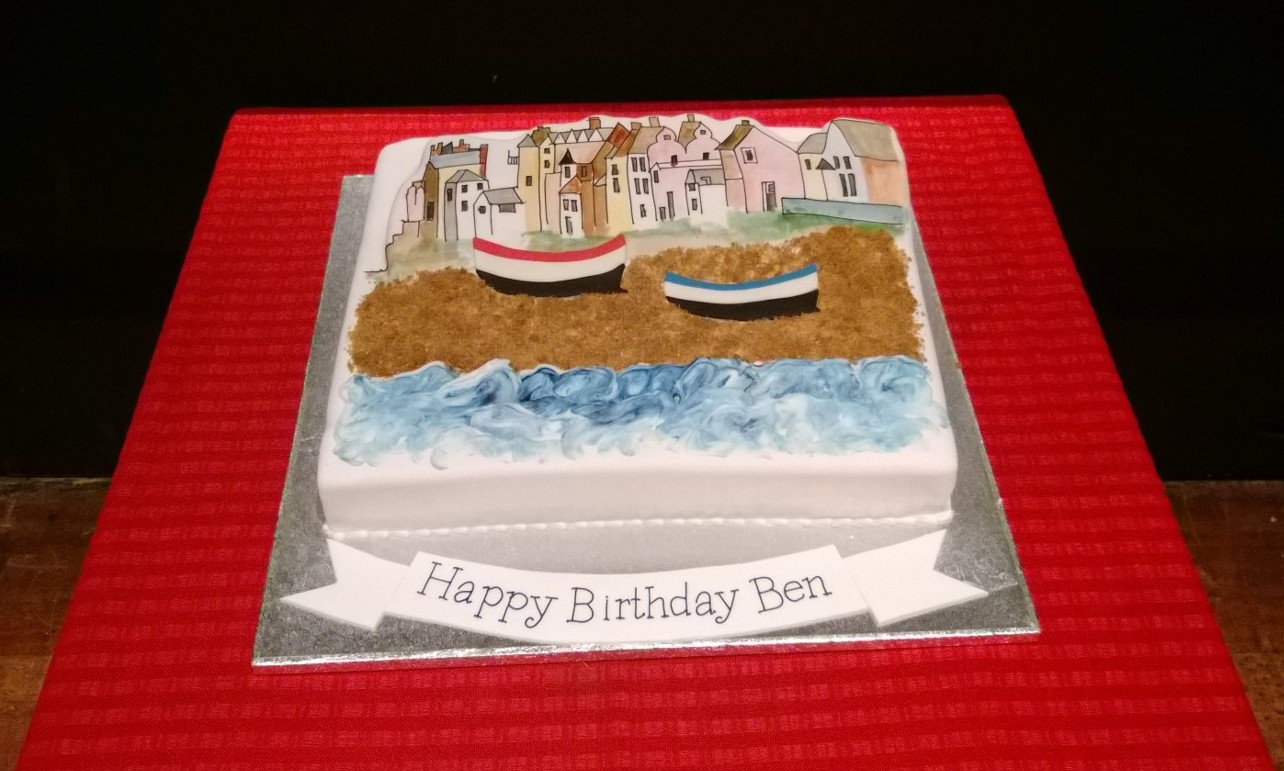
8pm and it’s back to Snape Maltings. Chamber music now in the big hall, and a full house for the Schubert G major Quartet and Britten’s Third, both written in the shadow of death - in fact Schubert never heard what he had written. I observe Colin Matthews in the audience; he worked with the dying Britten on preparation of the quartet score which was played for him at the Red House; what memories he must have! Now he’s Director of Music at the Britten Pears Foundation, one of the prime movers in these spendid celebrations. The Kuss Quartet play with a great deal of subtlety though I’m not sure I would have done the long repeat in the first movement of the Schubert; I find myself thinking of Schumann’s implied criticism, “heavenly length”, more than once. After the interval, the Third Quartet is a moving experience. Home to supper at the end of a long and powerful day.
Sunday 24 November
9am To the studio café the BBC has installed at the top of the Maltings, looking out over the marshes, for a conversation about Britten with Suzy Klein. I stay long enough to hear tenor Ben Johnson sing three of BB’s folk song arrangements with the guitar stunningly played by Sean Shibe. The BBC has really put out the boat for this Britten 100 Weekend; on air it’s been wall-to-wall Britten enriched by mini-documentaries and archive features, all seasoned by the wit of Sean Rafferty and the wisdom of fellow presenters Andrew McGregor, Tom Service and the Britten experts John Bridcut and Paul Kildea. The entire operation reminds me of the dedicated weekends John Drummond instigated decades ago – I remember fondly participating in Radio 3’s Week on the Danube and the Tanglewood Weekend. But they were back in the 1990s when there was more money around: it’s good to see controller Roger Wright going for broke and most effectively joining forces with the local planners, Aldeburgh Music.
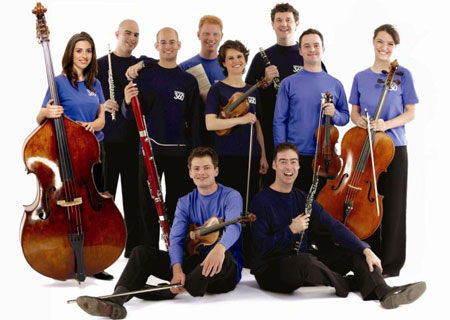 11am Snape Maltings. The last in the series of Britten quartet concerts and another large audience for a splendid programme given by Ensemble 360 (pictured left). Theirs is the most sonorous of the three groups we’ve heard and perfect for both BB’s early First Quartet, written in 1941, and Shostakovich’s atmospheric Piano Quintet, composed the year before - a nice pairing, preceded by the novelty of the three Divertimenti Britten composed for quartet while still at the Royal College. His fertility - the abundance and quality of his musical ideas - becomes apparent as never before thanks to this weekend overview of his output in so many fields.
11am Snape Maltings. The last in the series of Britten quartet concerts and another large audience for a splendid programme given by Ensemble 360 (pictured left). Theirs is the most sonorous of the three groups we’ve heard and perfect for both BB’s early First Quartet, written in 1941, and Shostakovich’s atmospheric Piano Quintet, composed the year before - a nice pairing, preceded by the novelty of the three Divertimenti Britten composed for quartet while still at the Royal College. His fertility - the abundance and quality of his musical ideas - becomes apparent as never before thanks to this weekend overview of his output in so many fields.
3.30pm Southwold Church. Northwards for the last time, in lovely weather, to another fine medieval church, where the BBC Singers are installed for choral music by Britten and his teachers Frank Bridge and John Ireland. Peter Pears sang in this group before the war; they begin today with the Hymn to St Cecilia which their forerunners premiered in 1942, a lovely detailed interpretation under the guidance of David Hill. During the course of the afternoon which climaxes with a spirited reading of Rejoice in the Lamb we have heard half a dozen of the individual voices of this excellent ensemble. They display total commitment to Britten’s music whether it be playful (as in his treatment of Christopher Smart’s weird and wonderful verses) or touchingly eloquent, when responding to the best passages in the poems of his mentor and friend W H Auden (“Out on the lawn I lie in bed” was a highlight of the Spring Symphony on Friday.)
7.30pm Snape Maltings (Britten and Pears pictured below in front of the hall in 1969 by Hans Wild). Aldeburgh Strings play the closing concert. Stunning is the only word for it. 30 hand-picked players, each one a virtuoso and coached for a week by leading professionals. The warmth and strength of their sound is overwhelming and they look good, too, standing in a broad semi-circle with only the cellos seated. Directed by Markus Däunert in the leader’s position, they begin with a full-blooded account of Purcell’s great Chacony and follow up with the Variations on a Theme of Frank Bridge.
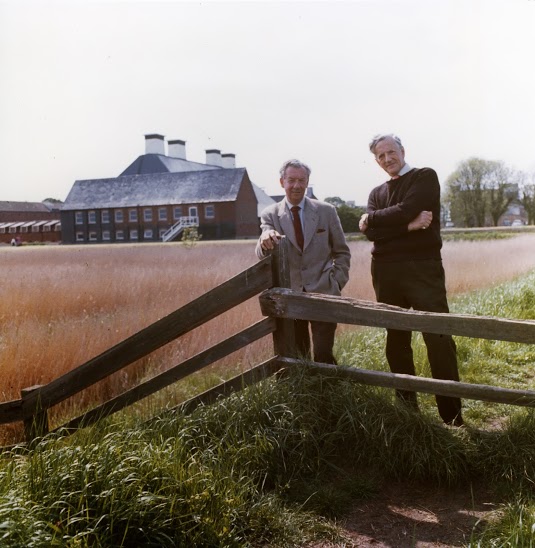 These players can cope with anything Britten throws at them by way of technical challenge – the Moto Perpetuo variation is dazzling, the Viennese Waltz and the Romance utterly charming, the Italian Aria breathtaking. They also know how to plumb the depths of feeling that emerge in the Funeral March and the fugal Finale.
These players can cope with anything Britten throws at them by way of technical challenge – the Moto Perpetuo variation is dazzling, the Viennese Waltz and the Romance utterly charming, the Italian Aria breathtaking. They also know how to plumb the depths of feeling that emerge in the Funeral March and the fugal Finale.
An exhilarating first half is followed by the 1943 Serenade. The strings are seated now: solo tenor Allan Clayton, finely nuanced throughout, and horn player Richard Watkins, flawless, stand in their midst until the last song: Watkins then goes off stage and his distant playing of the Epilogue is like the ghost of Britten himself, departing from his beloved Maltings. The music segues seamlessly into Arvo Pärt’s Cantus in Memoriam Benjamin Britten and the concert closes on a surge of emotion for which I can find no parallel in my own experience.
So thank you Aldeburgh Music for planning this weekend and providing a programme book worthy of the occasion. Thank you, BBC Radio 3 for backing it so comprehensively, and above all thank you to the Suffolk and Norfolk children (and their devoted teachers) for making so many of the events so very special.
Share this article
The future of Arts Journalism
You can stop theartsdesk.com closing!
We urgently need financing to survive. Our fundraising drive has thus far raised £33,000 but we need to reach £100,000 or we will be forced to close. Please contribute here: https://gofund.me/c3f6033d
And if you can forward this information to anyone who might assist, we’d be grateful.

Subscribe to theartsdesk.com
Thank you for continuing to read our work on theartsdesk.com. For unlimited access to every article in its entirety, including our archive of more than 15,000 pieces, we're asking for £5 per month or £40 per year. We feel it's a very good deal, and hope you do too.
To take a subscription now simply click here.
And if you're looking for that extra gift for a friend or family member, why not treat them to a theartsdesk.com gift subscription?

Add comment